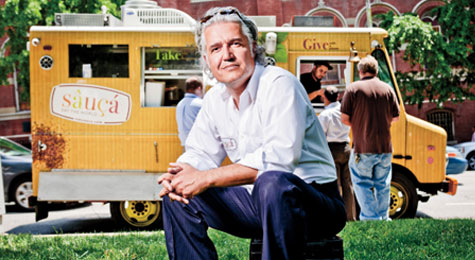Cooked up by epicurious entrepreneurs, the mobile food business is starting to whet the appetites of established companies.
Farhad Assari wants to start a franchise empire. The former Washington, D.C.-based investment banker envisions a day when his Sâuçá brand is stamped on restaurants, clothing lines, music and even sauces in the grocery store. For the time being, however, the ambitious entrepreneur is content to sell his Sâuçá street food out of a truck.
But this isn’t the roach coach of Health Department legend. Assari’s franchise, which opened in March 2010 and currently has four trucks in the D.C. area, is wildly popular, with lines sometimes 50 people deep and franchise inquiries up and down the East Coast.
“This is gourmet food. It’s very good quality,” Assari says. “My idea was to bring street food from around the world to the U.S. People in the U.S. see street food as dirty. I knew if I cleaned it up and made it sanitary, people would like it.”
Influential people like Assari’s concept, too. Last year, Sâuçá was named the winner of the Great Emerging Franchise Challenge, a contest judged by some of the biggest names in the franchise industry. And Assari is not alone on the road. At this year’s National Restaurant Association show in Chicago, food trucks garnered their own pavilion with six trucks–including Sâuçá’s–on the convention floor. That type of buzz has caught the franchise world’s attention. Not only are several food-truck concepts dipping their toes into franchising, but fast food and casual franchises are experimenting with a mobile presence as well.
The food-truck craze–whether it’s a bubble that will eventually burst or a new fixture on the American culinary scene–is pulling in big numbers. In a 2010 survey by Chicago-based food industry research and consulting firm Technomic for American Express, 26 percent of Americans said they had visited a food truck in the last six months, despite the fact that most trucks are concentrated in a few big cities. A popular Food Network reality show, The Great Food Truck Race, in which seven mobile gourmands try to outsell each other, has primed millions of people for mobile dining.
“Ten percent of the top 200 restaurant chains will have a mobile presence in the next 24 months,” says Aaron Noveshen, co-founder of Mobi Munch, a Los Angeles-based company that helps develop mobile platforms and runs several food trucks in California. “I can already count eight that do.”
Even if the hipster sheen fades from the gourmet food trucks, Noveshen believes they’ll still find a customer base at colleges, corporate campuses and other areas where full-service restaurants aren’t viable. Food trucks offer something that is always appealing: convenience.
“People are more time-starved than ever,” Noveshen says. “Mobile food will serve that need. It’s a fundamental thing that never goes away.”
In the franchising world, and especially at this experimental stage of the game, established businesses are testing the waters, mainly by using trucks as marketing tools. Taco Bell, Dairy Queen, Jack in the Box, Qdoba, Subway, California Pizza Kitchen, Carl’s Jr., In-N-Out Burger, Fatburger and even Sizzler have put together food trucks or trailers they can use for special events or promotional purposes.
Tasti D-Lite, the frozen yogurt franchise, was inspired by franchisee Aaron Webster, who last year outfitted a van and began serving the yogurt at community events. Now the company is outfitting 10 Mobile Tastis for use by franchisees throughout the system. Gandolfo’s New York Delicatessen is using trucks to get a feel for new markets as it begins offering franchises across the country.
Mauricio Acevedo, CEO of Banna-Strow’s Crepes & Coffee, a four-unit crepe franchise in the Miami area with plans to expand this year, doesn’t have to be convinced that food trucks are worthwhile. The company just began offering trucks as a franchise option. “For us, getting into the food-truck business was the next logical step,” Acevedo says. “A truck highlights all the advantages of our concept. We don’t have a kitchen, and everything happens on a griddle.”
Once BannaStrow’s trucks get rolling, they will likely develop regular stops or routes as customer awareness increases. “Our main opportunity is college campuses. We can literally take our restaurants to where students are,” he says. “Some campuses are so big students can’t make it to the food court. But they can pick something up from our truck and take it into Law 101.”
The convenience factor is something Thomas Jones and his sister, Cheryl, also focused on after buying their first Cousins Subs franchise in Franklin, Wis., a suburb of Milwaukee, in 2007. The shop came with a truck, which the previous owner had used mainly for catering. But Jones, who had managed sub trucks for Cousins at festivals and special events in the late 1990s, decided to put his into full service, bringing sandwiches to the business parks in the area on a set schedule.
Find the entire article <here>




